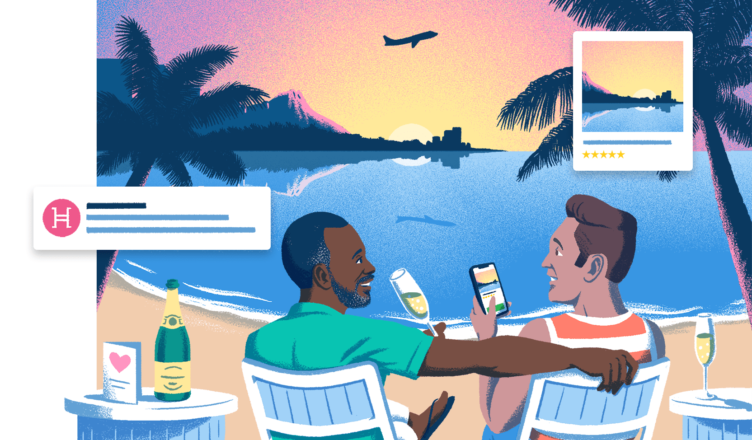Communication and marketing through social media have fundamentally changed how tourism companies interact with their target demographics. As the Internet and social channels have grown in popularity, travel marketing has been transformed, especially for the travel and hospitality sectors. Using social media to make purchasing decisions has influenced tourism marketing from the beginning to the end, from the way travelers research potential destinations to the activities they participate in after they arrive. Throughout this post, we have collected 5 ways of social media that have revolutionized tourism marketing. For further understanding, stay tuned!
Impact of Social Media on Tourism Marketing
Improved Customer Service
In addition to customer service and satisfaction, social media has also transformed the way people interact with each other. The vast majority of brands have a social media presence used to identify unsatisfied or confused customers and, when necessary, assist them. Customer service that is sincere and genuine builds a strong reputation among both current and potential customers. It is particularly easy for the best hotels in Kern County, California to handle hospitality issues and provide a human touch to otherwise frustrating experiences.
Additionally, customer success representatives need to be intentional in their social media interactions. In order to learn more about your guests, you can use social media as a social listening tool. Using social media as an opportunity to listen to and understand customers can help you create a memorable guest experience.
Evolution of Travel Research
Social media has had the most profound impact on the tourism industry to date by democratizing online reviews. Nowadays, travelers conduct their research online about their future travel destinations and accommodations. A whopping 89% of millennials base their travel plans on content posted online by their peers.
Social media platforms such as Instagram and crowd-sourced review sites such as TripAdvisor have become popular places for people to find travel inspiration and validation from their peers. Using that site, travelers can easily find the best hotels, other travelers’ photos, check-ins, ratings, and more. From a viewpoint other than that of a brand, real guest feedback allows the destination to showcase the in-person experience that it offers.
Growth in Social Sharing
It has always been popular for people to share their travel photos and videos. Through social media, people are able to share their travel experiences with a wider audience than ever before. In fact, 97% of millennials share photos and videos of their travels online, creating a peer-to-peer network that serves to inspire potential guests.
Clearly, this trend isn’t going unnoticed. The majority of hotels and resorts run social contests and campaigns to ensure they get credit for the social media activity of their guests. The best hotels in Kern County, California, used photos of guests instead of their own. Users were encouraged to take photos, tag them on social media, and ultimately create user-generated content for the brand that is free, authentic, and can be repurposed across its marketing channels.
Redefining Travel Agencies
A major impact of social media has also been seen in travel agency models. Information availability and the ease of self-service booking have forced travel agencies to move away from brick-and-mortar models. In fact, travel agencies remain responsible for 55% of airline and cruise reservations, 77% of package reservations, and 73% of vacation packages. However, as new technology and market trends have emerged, many agencies are now focusing more on online interactions.
The generation prefers ‘experiences over materials’, so agents working with millennial travelers should keep this in mind. Consider offering unique experiences that will inspire a great Instagram post instead of trying to upsell them on flight upgrades and accommodations. In spite of the increase in self-booking options, travel agencies still have a strong advantage because many travelers prefer a personal touch even if they struggle to remain relevant.
Modifying Loyalty Programs
The cost of acquiring new customers is much higher than the cost of retaining existing ones, as most marketers are aware. The travel business model relies heavily on loyalty programs, and social media has had a massive impact on how these programs are built. Several customers are aware that the opinions they share with their network have a significant impact. Therefore, these guests feel entitled to compensation for the word-of-mouth marketing they do for a company. The majority of millennials who participate in loyalty programs are very likely to promote a brand in exchange for loyalty points.
It is easier than ever for hotels to discover passionate guests and reward them with technologies that allow mentions and tags to be tracked across social media channels. Brand promotion across social media platforms can be incorporated into existing loyalty tier programs through social media sharing and posting. Guests who share on social media how easy it is to redeem perks and benefits in loyalty programs will motivate others to participate in that program because they see that the perks are attainable.
Final Words
Marketing in the leisure and hospitality industry has changed as a result of social media. Online customer service plays an important role in building a positive brand reputation because most travelers base their travel plans on reviews and social media shares. Using social media to curate positive reviews and encourage social shares can help hospitality brands build positive brand awareness like best hotels in Kern County to increase brand loyalty and show off just how much they have to offer

